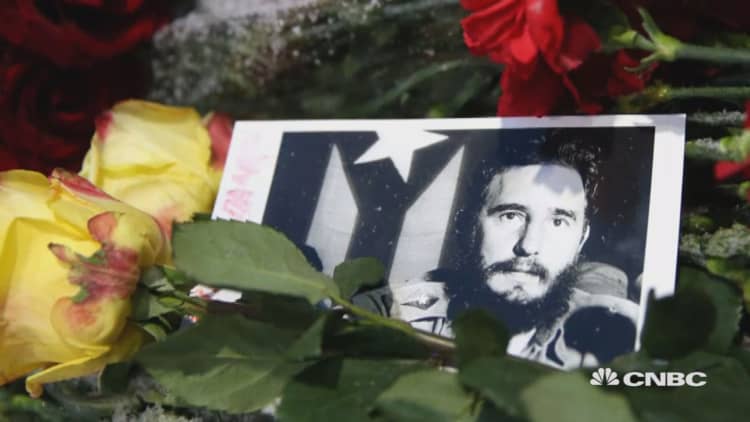
As international tributes and expressions of condolences for deceased Cuban leader Fidel Castro poured in on Saturday, there was one group whose mood was decidedly celebratory: Cuban-Americans, who took to the streets to rejoice in the strongman's demise.
The contrast was stark, and sparked a furious debate about Castro's legacy and the practical import of his commitment to Communism. A world-bestriding figure who outlasted multiple U.S. presidential administrations, the Cuban leader cultivated good will across Latin America and Africa even as he earned both praise and scorn across the American political spectrum.
Castro's moves to increase access to health care and education and equality were often cited by his proponents—and he had many—as reasons to lionize his achievements. Yet Castro's detractors said those accomplishments were overshadowed by the government's complete control over free speech, political dissent and the economy.
In the years following Castro's ascent, Cuban gays were routinely rounded up and put in labor camps. Meanwhile, documents dating back to the revolution's heady early days documented thousands of firing squad executions of political opponents and people deemed as enemies of the state, according to Cuba Archive.
President-elect Donald Trump excoriated Latin America's last remaining dictatorship, while President Barack Obama—who made a historic journey to the country earlier this year in an effort to reverse decades of what he called "a failed policy"—said that "history would record and judge" Castro, who Obama called a "singular figure."
The Cuban government, headed by Fidel Castro's brother Raul, is planning a nine-day mourning that will culminate in a burial on December 4 in Castro's birthplace of Santiago de Cuba.
In Miami—a bastion of Cuba's immigrant and exile community—fireworks and boisterous spontaneous street parties erupted after news that the 90-year old who ruled the island for more than 50 years was reviled by Cuban-Americans had died after years of illness.
Cubans who fled the island and resettled in the U.S. in the decades after Castro ascended to power in 1959, reveled in the news.
The Senate's two Cuban-American Republicans, Florida's Marco Rubio and Texas' Ted Cruz—both of whom ran for president—condemned Castro's legacy. On social media, Cruz inveighed against the "brutal Communist dictatorship" that split families and imprisoned countless political opponents.
Rubio minced no words, calling the Cuban leader "evil and murderous" in a sharply worded statement, a sentiment echoed by Trump.
"Today, the world marks the passing of a brutal dictator who oppressed his own people for nearly six decades. Fidel Castro's legacy is one of firing squads, theft, unimaginable suffering, poverty and the denial of fundamental human rights," the president-elect said in a statement.
"While Cuba remains a totalitarian island, it is my hope that today marks a move away from the horrors endured for too long, and toward a future in which the wonderful Cuban people finally live in the freedom they so richly deserve," he added.
Some world leaders, many of them left-leaning, hailed the Castro's construction of a "world class" medical and educational system, and his ability to openly defy and outlife U.S. foreign policy. In a statement, UK Labour Party leader Jeremy Corbyn lauded Castro's "many" achievements.
Yet in places like Miami, there was a markedly different sentiment. Castro's fiercest critics faulted the communist leader's record on human rights and the island's repressive state-controlled economy where poverty and lack of freedom are the norm.
Despite Obama's aperture, the U.S. embargo remains the centerpiece of U.S.-Cuba relations in large measure because of continued support from Cuban-Americans and Congressional Republicans.
Indeed, the economic and social collapse of oil-rich Venezuela, which for years provided economic and moral support to Cuba, has been called a failed experiment in socialism and drawn unfavorable comparisons to the Caribbean island. The late Venezuelan leader Hugo Chavez and Castro shared a close bond before the former passed away in 2013. At the time, Castro hailed Chavez as an ally that was Cuba's "best friend."
The fissure in public sentiment tends to cleave along political lines. Civil rights leaders viewed Castro as an ally in the civil rights era. The Cuban government harbored high-profile black power figures like Joanne Chesimard, a Black Panther activist convicted of shooting a police officer in New Jersey in 1977.
Castro's affinity for U.S. civil rights garnered him respect among African-Americans, but was dismissed by the Cuban leader's detractors as little more than public relations. Post-revolution Cuba discriminated against both blacks and gays, the latter about which Castro himself expressed public regret several years ago.
The Miami-based exile group, the Cuban American National Foundation, said in a statement that Cubans were now at a "momentous crossroad" after Castro's death.
"Fidel Castro has died after imposing his will on the Cuban people for more than half a century. As Cubans, this historical moment forces us to consider our own future; and encourages us to put aside our anguish, our differences, and our fear in order to pave the way for a brighter future," the organization added.


